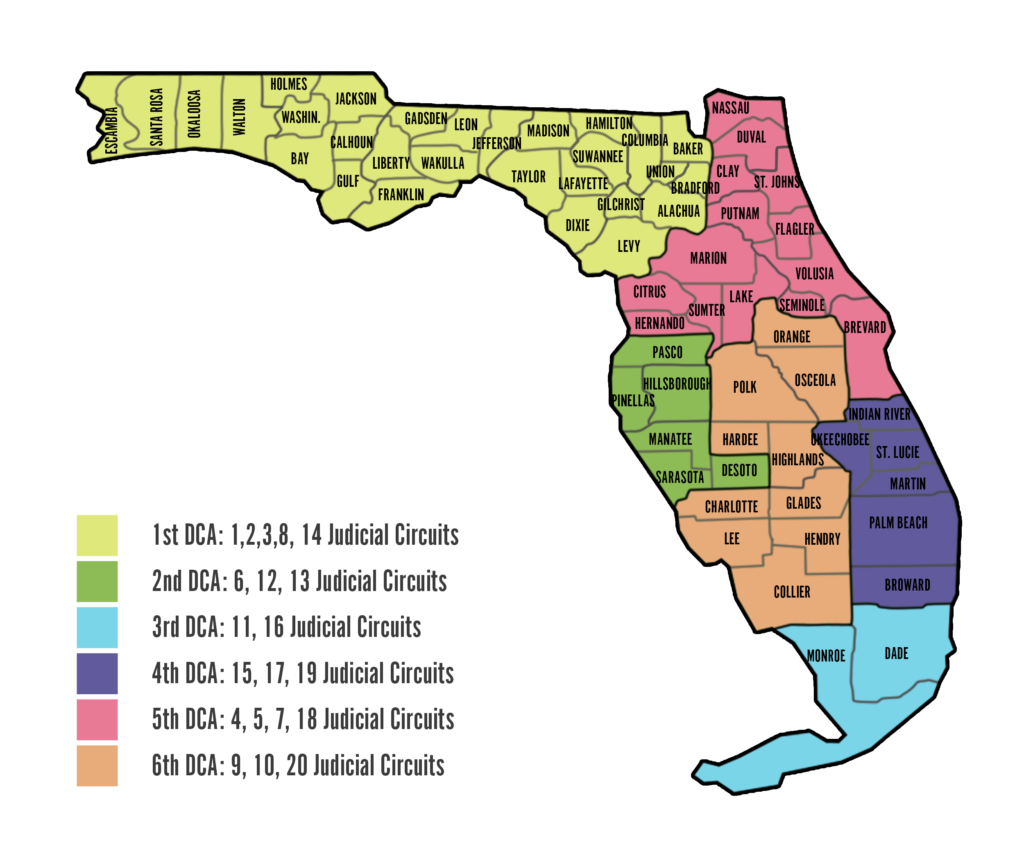
Floridians will soon experience swifter justice: Come January 1, 2023, Florida will get a Sixth District Court of Appeal
Overview | Blog Posts | Appellate | Mihaela Cabulea | Related | Print | Share
July 7, 2022
In an attempt to improve the judicial process, the Florida Supreme Court recommended in November 2021 the addition of a sixth district court of appeal. The court’s recommendation was the result of the work done by the District Court of Appeal Workload and Jurisdiction Assessment Committee, formed by Chief Justice Charles Canady. The Committee concluded that the creation of a sixth district court of appeal will boost citizen trust and confidence in the judiciary. The majority of the justices agreed with the Committee’s conclusion and also certified the need for six new appellate judgeships. The sole dissenter, Justice Polston, pointed out that the majority opinion adopted the Committee’s recommendation despite the fact that it was not supported by any of the five chief judges of the existing district courts of appeal. Justice Polston agreed with the chief judges of the five district court of appeals that no changes were warranted. He further noted that under the annual certification process for the need for additional judges, no district court requested certification of additional judgeships nor were such judgeships justified by the projected judicial need analysis.
As a result of the Supreme Court’s recommendation, the Legislature proposed bill HB 7027 that was signed into law by Governor DeSantis at the beginning of June 2022, creating the first new appellate court since 1979 when the Fifth District Court of Appeal was created.
According to the newly enacted legislation, as of January 1, 2023, the composition of the Third and Fourth District Courts of Appeal will remain the same and the new configuration of the other four district courts of appeal will be as follows:
- The First Appellate District will be composed of the First, Second, Third, Eighth, and Fourteenth Judicial Circuits;
- The Second Appellate District will be composed of the Sixth, Twelfth, and Thirteenth Judicial Circuits;
- The Fifth Appellate District will be composed of the Fourth, Fifth, Seventh, and Eighteenth Judicial Circuits;
- The Sixth Appellate District will be composed of the Ninth, Tenth, and Twentieth Judicial Circuits.

The headquarters of the Second Appellate District will move from Lakeland to the Sixth Judicial Circuit, Pinellas County and the headquarters of the Sixth Appellate District will be in the Tenth Judicial Circuit, Lakeland, Polk County. The headquarters of the other district courts of appeal will remain unchanged:
- Second Judicial Circuit, Tallahassee, Leon County for the First Appellate District;
- Eleventh Judicial Circuit, Miami-Dade County for the Third Appellate District;
- Fifteenth Judicial Circuit, Palm Beach County for the Fourth Appellate District; and
- Seventh Judicial Circuit, Daytona Beach, Volusia County for the Fifth Appellate District.
Under the newly adopted legislation all the property including equipment, furnishings, artwork, and fixtures located at the Lakeland headquarters of the current Second District Court of Appeal must remain in Lakeland and will have to be transferred to the Sixth District Court of Appeal, unless the Office of the State Courts Administrator determines that the property is critical to the continuing operations of the Second District Court of Appeal.
The number of judges for each district court of appeal will be as follows:
- 13 judges in the first district;
- 15 judges in the second district;
- 10 judges in the third district;
- 12 judges in the fourth district;
- 12 judges the fifth district; and
- 9 judges in the sixth district.
On January 1, 2023, the Governor must recommission any judge whose district was realigned pursuant to the newly enacted law to the new district where the judge resided on December 22, 2021, except that any judge whose district was modified by the realignment and who is seeking retention in office at the 2022 general elections, and is retained by the voters, must be recommissioned on January 3, 2023. The following judges will be recommissioned as of January 2023:
- Judges Scott Makar and Harvey L. Jay of the First District Court of Appeal will be recommissioned to the Fifth District Court of Appeal;
- Judge John K. Stargel of the Second District Court of Appeal will be recommissioned to the Sixth District Court of Appeal; and
- Judges Jay P. Cohen, Meredith L. Sasso, Dan Traver, Mary Alice Nardella, Carrie Ann Wozniak of the Fifth District Court of Appeal will be recommissioned to the Sixth District Court of Appeal.
To ensure compliance with the residency requirements that members of judicial nominating commissions must meet at the time of their appointment, the terms of all members of the judicial nominating commissions of the First District Court of Appeal, the Second District Court of Appeal, and the Fifth District Court of Appeal were terminated under the new law. The Governor must make new appointments to these three commissions and to the new Sixth District Court of Appeal.
The creation of a Sixth District Court of Appeal will most likely lead to a swifter resolution of cases in appellate courts, but it will be interesting to see if the district courts of appeals will start issuing more written opinions, like federal appellate courts do. One of the most challenging tasks for an appellate attorney is to explain to his or her client why the appellate court ruled in a certain way when the court simply issues a per curiam affirmance without written opinion. Written opinions provide an insight into the court’s reasoning and give the litigants the satisfaction that the court considered their arguments and positions even if they did not prevail. But the value of written opinions is not limited to giving the litigants the satisfaction of having had their day in court. They also provide guidance to the lower tribunals and practitioners and can promote transparency and similar outcomes in similar cases.



